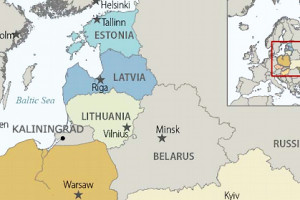Ukrainians Attempting To Enter Russia Face Days-Long Wait On Border

(Article text Copyright © 2023 RFE/RL, Inc. Reprinted with the permission of Radio Free Europe/Radio Liberty, 1201 Connecticut Ave NW, Ste 400, Washington DC 20036. – rferl.org – Yulia Paramonova – June 27, 2023 – article text also appeared at rferl.org/a/ukrainians-stranded-eu-russia-border/32478057.html)
In the neutral territory between Estonian and Russian checkpoints, at Luhamaa on June 21, dozens of Ukrainian passport holders could be seen waiting in the sun as vehicles rolled past.
The Ukrainians say they have endured days in the open under the summer sun and nights being swarmed by mosquitos, as other passport holders are ushered through.
“Look, my arms and legs are sunburned,” one woman named Maria said. “For two days I’ve been here.”
Maria is hoping to travel from the border near Pskov to Russian-occupied Mariupol. The southeastern Ukrainian city was largely destroyed in the Russian invasion, but Maria’s apartment, she says, appears to have survived intact.
Viktoria, a Ukrainian heading to eastern Ukraine, explains that with all border crossings between Russia and Ukraine closed, “we travel in a huge circle through the European Union.
“And we have so many people who travel,” she says. “We get to the [Estonian-Russian] border by bus, wait here for two or three days, then we pass, take another bus, and go to Donetsk.
According to Viktoria, “There are no other options. Some people are visiting their children or grandchildren. Others are traveling to visit sick parents. As long as people are healthy enough,” the Ukrainian says, “they will travel.”
Olga, 62, is also hoping to reach Mariupol.
“My house is ruined and everything left was looted. I’m going there just to collect some documents,” she said, adding, “It may be possible to get some form of housing, though I heard only collaborators are given housing and anyone against the occupation gets nothing.”
Recently, the Ukrainians say, an elderly woman fainted while waiting in the summer heat. Since then, the Russian border guards have been fast-tracking Ukrainians over 65 and parents with young children.
For the rest, the queue is virtually motionless, with just a couple of people passing every few hours.
The editors of RFE/RL’s North.Realities, a regional news outlet of RFE/RL’s Russian Service, sent a query to the Russian border authorities asking what is causing the massive delays for Ukrainian passport holders. No response had been received at the time of publication.
After the days-long wait in the open air, the Ukrainians ushered into the Russian border facility face questionnaires, followed by hours more waiting. The forms ask for personal data such as where the person came from and where they will go, as well as personal opinions on topics such as the policies of the Ukrainian government.
An in-person interview follows that can last up to one hour. One young man claims the Russian border guards recovered deleted contacts from his phone and began calling them to find out who he’d been speaking to, and what about.
Anya, a Ukrainian woman, is traveling with her two boys, one of whom is younger than 2. Although they were quickly ushered into the Russian checkpoint, Anya and her boys spent a day and night waiting inside the facility before being let through.
Earlier in the war, Anya’s husband was evacuated from the Ukrainian war zone into the Russian city of Rostov. When she and her sons fled to safety into the European Union she says, “The children were growing up without a father. That’s why we’re going. I can live in Russia. I don’t feel any hostility.”
Volunteers on the Russian and Estonian side of the border are unable to enter the neutral territory but offer help where they can.
Elena, a humanitarian volunteer on the Russian side, said the situation is similar at all five border checkpoints from EU territory into Russia’s Pskov region. She says food and water is sent into the neutral areas where the Ukrainians are waiting, largely by asking truckers to carry it through the border.
“But we still need to find someone who can take it through,” she says.
Elena says, “It is not clear who will be detained and who will be let through.” Men generally receive the longest interrogations, she says.
“There was a case when a young man was kept in a cell for six days,” Elena says. “Then [the Russian border guards] simply gave him some tea and let him go. Everyone understands that this is chaos, but no one can influence the situation.”
